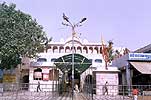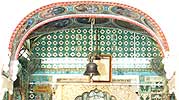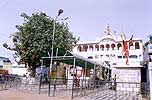| |
|
|
|
 Cause
of Establishment: Cause
of Establishment:
The
history of Shri Shyam originates from the Mahabharata. Bhima was
a Pandava prince, whose son Ghatotkacha was the father of
Barbarika, hence Barbarika was the grandson of Bhima. Owing to
the fabulous chivalry and prowess of Barbarika, Krishna did not
want him to participate in the great war. So, he begged of him
his head which Barbarika gave him without any hitch but on the
condition that he be allowed to witness the war. Krishna set up
his head on a hilltop and also blessed him that he would be
deified and worshipped in Kaliyuga like him and that his
worshippers shall have their wishes fulfilled. Some 975 years
ago the wife of Roopsingh Chauhan saw in her dream that deity
instructed him to take his image out of the earth.
The indicated place, when dug up, yielded the present idol of
Shri ShyamJi, which was enshrined in the temple. That spot is
now known as Shyam Kund.
|
|
|
|
|
|
| Brief
of the Diety: |
|
 Lord
Shyam Ji- his head is worshipped. The idol is
made of rare stone and commands tremendous
respect from visitors. Shyam Ji is the family
god of lacs of families. Lord
Shyam Ji- his head is worshipped. The idol is
made of rare stone and commands tremendous
respect from visitors. Shyam Ji is the family
god of lacs of families.
Religious
sect to which the temple belongs: Vaishnava
sect.
|
| Architecture
of the Temple: |
| Important
Architectural Characteristics: |
|
 The
temple has been built in ancient style of
architecture. The shutters of the Sanctum
Sanctorum are covered with silver sheet beautifully. Outside is the prayer hall,
Jagmohan. The walls of which have beautiful
depiction of mythological scenes elaborately
painted. The entrance gate and exit gate are
made of marble, the brackets of which are of
marble having ornamental floral designs. The
temple has been built in ancient style of
architecture. The shutters of the Sanctum
Sanctorum are covered with silver sheet beautifully. Outside is the prayer hall,
Jagmohan. The walls of which have beautiful
depiction of mythological scenes elaborately
painted. The entrance gate and exit gate are
made of marble, the brackets of which are of
marble having ornamental floral designs.
|
|
|
| Important
Architectural Characteristics: |
|
 Originally
the temple was built 975 years ago by Smt. Narmada
Kanwar and her husband Shri Roop Singh Chauhan. In
Samvat 1777 (1720 A.D.), Diwan Abhaisingh at the behest
of the then king of Jodhpur, renovated the old temple.
The temple took its present shape at this time and the
idol was enshrined in the Sanctum Sanctorum. There is an
open chowk before the entrance gate of the temple. A big
hall for prayers of the size 40'6"x15'4" is
also there. In the South-East is the temple of GopinathJi. For the management and disposal of temple work, a
seven member committee is constituted. The Public Trust
of this committee is registered under registration No.
3/86. Originally
the temple was built 975 years ago by Smt. Narmada
Kanwar and her husband Shri Roop Singh Chauhan. In
Samvat 1777 (1720 A.D.), Diwan Abhaisingh at the behest
of the then king of Jodhpur, renovated the old temple.
The temple took its present shape at this time and the
idol was enshrined in the Sanctum Sanctorum. There is an
open chowk before the entrance gate of the temple. A big
hall for prayers of the size 40'6"x15'4" is
also there. In the South-East is the temple of GopinathJi. For the management and disposal of temple work, a
seven member committee is constituted. The Public Trust
of this committee is registered under registration No.
3/86.
|
| Material
of Construction: |
Lime
mortar, marble and tiles.
|
| Total
Construction Time: |
8
months in building the original temple |
|
| Religious
aspects of temple: |
|
 Lord
Shyam is worshipped as Krishna himself. Devotees from
far-flung areas and distant places such as Kolkata,
Mumbai, Hyderabad, Nepal, Delhi, Uttar Pradesh, Haryana
and Panjab assemble here on days held specially sacred
to Lord Shyam Ji. In a routine way, hundreds of visitors
visit everyday. A number of Dharmashalas (Charity
lodges) are available for their comfortable stay. Newly
married couples come to pay homage; newly born babies
are brought to the deity's temple for Mundan (the first
hair shearing) ceremony and Sawamany feasts. Lord
Shyam is worshipped as Krishna himself. Devotees from
far-flung areas and distant places such as Kolkata,
Mumbai, Hyderabad, Nepal, Delhi, Uttar Pradesh, Haryana
and Panjab assemble here on days held specially sacred
to Lord Shyam Ji. In a routine way, hundreds of visitors
visit everyday. A number of Dharmashalas (Charity
lodges) are available for their comfortable stay. Newly
married couples come to pay homage; newly born babies
are brought to the deity's temple for Mundan (the first
hair shearing) ceremony and Sawamany feasts.
|
| Unique
features of the temple: |
|
 People
filled with devotional fervor come here and take a holy
dip in the Shyam Kund. They believe, this sacred bath
will relieve them of diseases and contagion. People
filled with devotional fervor come here and take a holy
dip in the Shyam Kund. They believe, this sacred bath
will relieve them of diseases and contagion.
|
| Festivals
& Fairs in Temple (Main Events): |
|
From
tenth day to twelfth day of the month of Falgun, a great
festival is held and attended by millions of devotees.
Other festivals are Janamashthami, Jal Jhulani Ekadashi,
Holi, Basant Panchami.
|
|
| Timings: |
| Morning
Time: |
Winter:
6 am to 12 am, Summer: 4.30 am to 1 pm |
Evening
Time:
|
Winter:
4 pm to 9 pm, Summer: 5 pm to 10 pm |
| Custom
& Traditions of Temple: |
|
Traditions
and customs of Vaishnavas are followed. Descendants of
the original founders Shrimati Narmada Kanwar and her
husband Shri Roop Singh Chauhan have been rendering
service to the deity.
|
| Details
of Temple: |
| Sanctrum:(Sanctorum) |
1 |
 |
| Others: |
Open
chowk before entrance gate, big hall
(40'6"x15'4") for prayers |
| Vandana
(If any particular) in text: |
|
Praise
of Shyam Sunder
|
| Issues
requiring global attention for conservation,
protection and improvement of the temple: |
|
The temple is a centre of faith of millions of
people.
|
|
|
|

